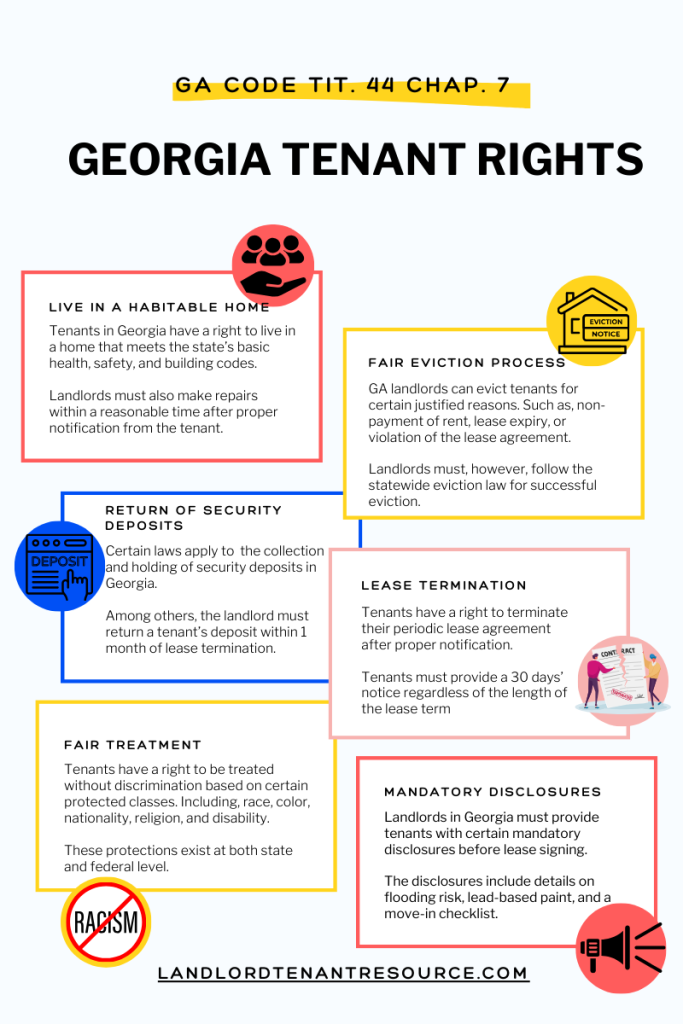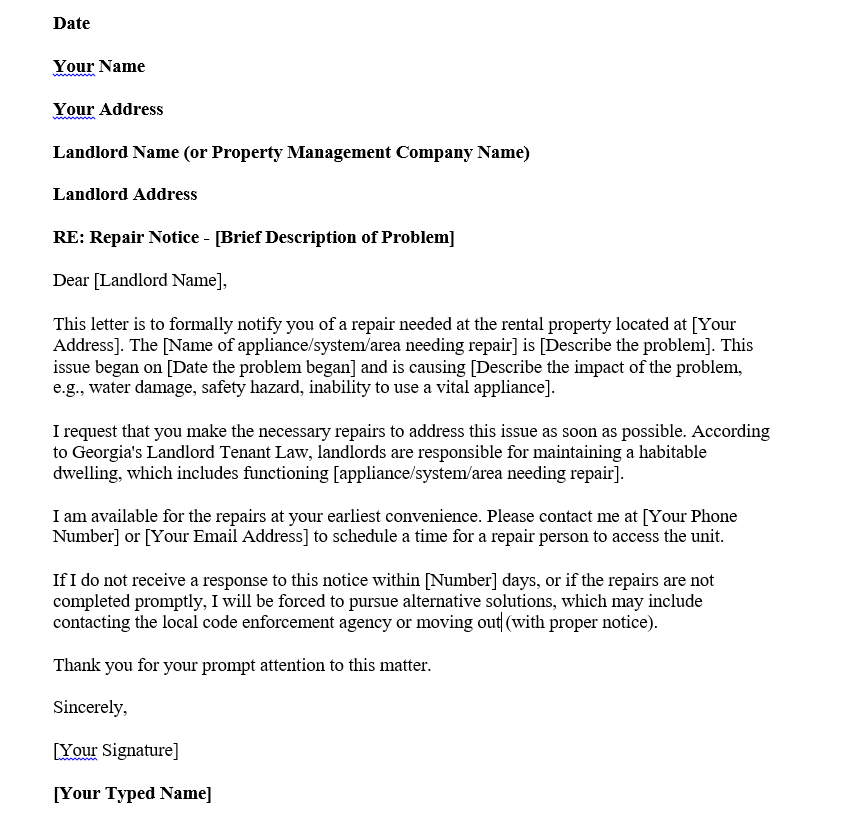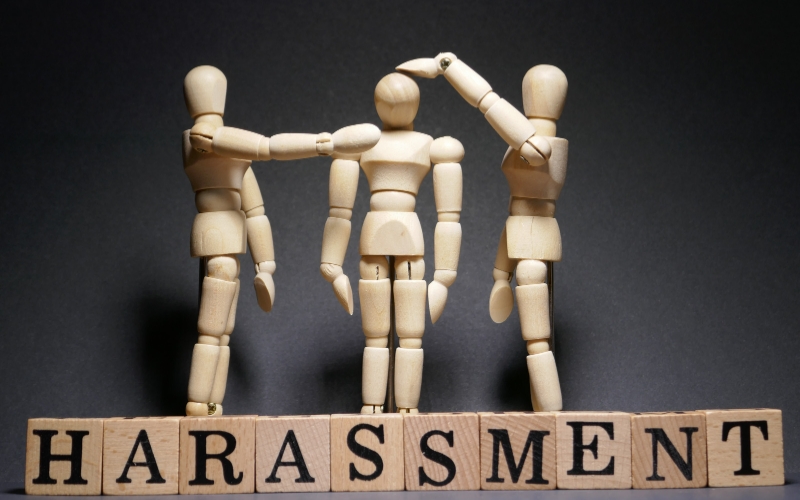Last Updated on May 25, 2024 by Kelvin Nielsen
Can a landlord enter without permission in Georgia? Technically speaking, yes. A landlord can legally enter your property without seeking your permission first. Note the keyword there, though – technically speaking!
Georgia is inarguably a landlord-friendly state. There are no rent control laws, no specific time limit for repairs, and no specific landlord entry rules.
That said, as a tenant, you have a right to enjoy your rented premises in peace and quiet. The following are answers to commonly asked questions regarding whether a landlord can enter your GA home without permission.
What Does Georgia Law Say about Landlord Entry?
GA Code Title 44 Chapter 7 makes it crystal clear that landlords have a right to enter rented premises for purposes reasonably mentioned in the lease agreement. Such as:
- Carry out routine maintenance and repairs.
- Carry out inspections.
- Show the property to prospective buyers, lenders, and renters.
- Respond to emergencies, such as fire, flooding, or suspected gas leaks that would potentially render the unit uninhabitable.
Georgia law has no strict regulations on a landlord’s access rights to a rental property. This is unlike, for instance, the southern neighboring state of Florida, where landlords must give tenants a 24-hour advance notice before entry.
So, with the absence of strict regulations on landlord entry, landlords can technically enter a tenant’s unit without notice. However, a landlord can only enter for purposes related to the tenancy, with reasonable notice required outside of emergencies.
To avoid potential landlord harassment claims by tenants, most landlords in Georgia provide their tenants with a notice of at least 24 hours before entry.
Furthermore, the entry times must be reasonable as well. Generally speaking, this usually means the hours between 8 AM and 5 PM during weekdays and between 9 AM and 3 PM during weekends.
When Can a Landlord Enter Without Permission in Georgia?
As already aforementioned, Georgia doesn’t have a specific law that dictates landlord entry rules. However, this doesn’t mean that a landlord can enter whenever they like and for whatever reason.
That said, the following are some exceptions to such rules.
One exception is during an emergency. When an emergency strikes at a rental property, a landlord can enter without any advance notice. The following are some examples of situations that can qualify as emergencies in Georgia.
- Fire or smoke. If a fire or smoke is detected coming from your unit, the landlord can enter to ensure everyone’s safety.
- Flood and water leak. Major water leaks can cause serious damage to a property and even neighboring units. In such cases, the landlord can enter to prevent further property damage.
- Gas leakage. A gas leak can be a serious situation requiring immediate action. The landlord can enter to check for the source and ensure the tenant is safe.
Another exception is if the landlord suspects the tenant has abandoned the unit. If there are glaring signs that you have abandoned the unit, the landlord may enter to check on the property.
Telltale signs of tenant abandonment include the following.
- If rent payments have stopped and the tenant isn’t contacting you.
- The mailbox has piled up with uncollected mail and packages.
- Utilities have been disconnected due to non-payment.
- Signs the property has been neglected, such as uncollected garbage outside or overgrown lawns.
What to Do If Landlord Keeps Entering Without Permission in Georgia?
Before taking any action against your landlord, you will want to do a few things first.
Firstly, review the terms of the lease, especially regarding landlord entry. Does it highlight the conditions for entry, such as notice requirements, reason for entry, and time for entry?
Secondly, let your landlord know that they have violated your privacy rights. Clearly express your discomfort and emphasize your rights to peace and quiet enjoyment.
Thirdly, keep proper documentation of all the correspondence you’ve had with the landlord.
Next, consider all your options. Under Georgia law, the following are some legal options you could pursue.
- File a complaint with the local housing authority.
- Break the lease without penalty. Please note, however, that the violation must be truly serious for you to consider this option.
- Seek legal advice from a professional lawyer.
Frequently Asked Questions (FAQs): Can a Landlord Enter Without Permission in Georgia?
Q: What are my rights as a tenant in Georgia?
A: You have a smorgasbord of rights under Georgia law. The following is a basic overview.

Q: Can a landlord evict you for no reason in Georgia?
A: Absolutely not! Even without a lease, the landlord must follow specific rules to evict you. They cannot try to evict you illegally by engaging in “self-help” eviction tactics. Such as, throwing out your personal belongings, locking you out, or shutting down your utilities.
What’s more, the landlord can also not evict you due to a protected class or as a retaliatory tactic.
Q: How to write a sample request letter for repair and maintenance?
A: It’s important that you know how to write a proper letter for repair and maintenance. It should contain all important details, such as your name and contact address, landlord information, date, purpose, description of the issue, urgency, and signature.
The following is a template you can use whenever requiring repairs to your Georgia rental home.

Q: Can maintenance come in without notice in Georgia?
A: Just like landlords, maintenance cannot come in without some sort of notice. The only exception to reasonable notice and reasonable times is during emergencies. In cases of a fire outbreak or flooding, the landlord may not need to notify you of their intended entry beforehand.
You can read more here.
Conclusion
Can a landlord enter without permission in Georgia? Technically speaking, yes! They could enter without providing you with an advance notice. However, this could be a recipe for potential landlord harassment lawsuits. And it’s for this reason that, despite Georgia not having advance notice requirements for landlords, most landlords still include specific requirements in the lease.
Disclosure: The content herein isn’t a substitute for advice from a professional attorney. It’s only meant to serve educational purposes. If you have a specific question, kindly seek expert attorney services.
Sources: GA Code Title 44 Chapter 7, Landlord Harassment, Georgia Tenant Handbook

I am a real estate attorney with over 11 years of experience in tenant eviction cases. My mission here at LTRC is to help answer your commonly asked questions on everything regarding real estate laws, especially on eviction matters.
I’m a member of the following professional organizations: Attorneys’ Real Estate Councils of Florida (ARECs), Florida Bar Real Property, Probate & Trust Law Section, American College of Real Estate Lawyers (ACREL), and the Florida Association of Community Managers (FACM).







